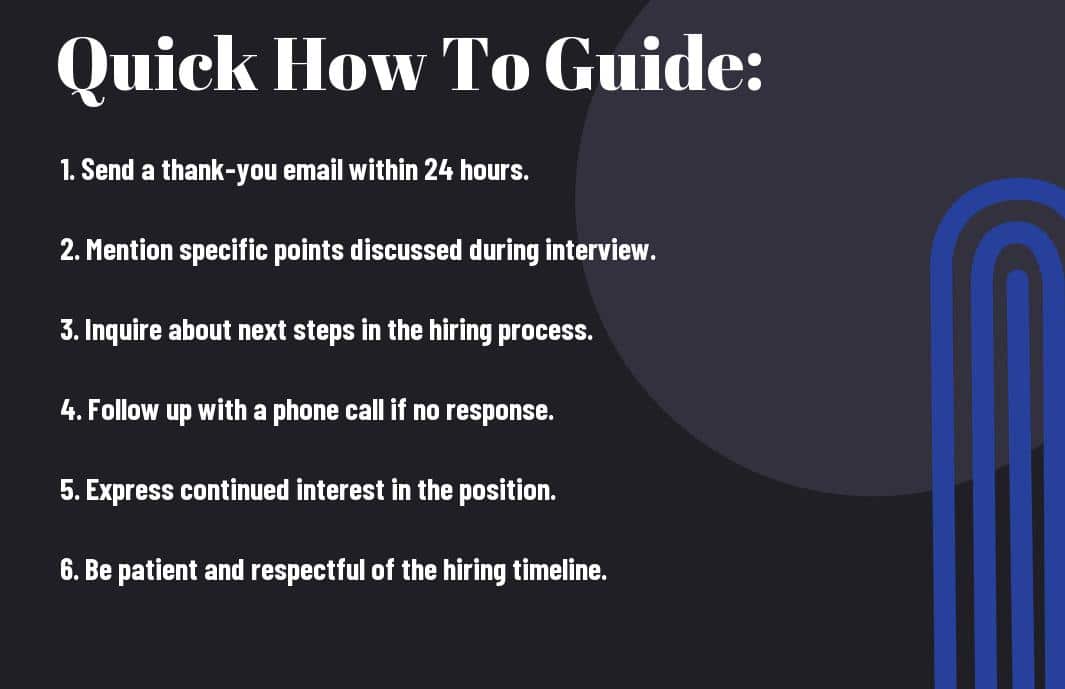Table of Contents
ToggleFollow Up On Job Interview Just had a killer job interview and wondering what’s next? Following up is key to landing that job. Don’t just sit back and wait for the phone to ring, take control of the situation. In this post, I’ll give you the ultimate guide on how to stand out from the crowd with your follow-up game. We’ll cover the best practices, timing, and methods to turn that interview into a job offer. Let’s dive in and show them why you’re the best candidate for the job!
Key Takeaways: Follow Up On Job Interview
- Timing is crucial: Follow up within 24-48 hours of the interview to demonstrate your enthusiasm and interest in the position.
- Personalize your follow-up: Reference specific details from the interview, reiterate your qualifications, and express gratitude for the opportunity.
- Stay proactive and persistent: If you haven’t heard back within a week, don’t be afraid to send a polite follow-up email or make a brief phone call to inquire about the status of your application.

Pre-Interview Preparation
Research Is Key: Understanding the Company
There’s no excuse to walk into a job interview uninformed. Preparation is key, and that means diving deep into understanding the company you’re interviewing with. Research their mission, values, recent projects, and their company culture. This not only shows your genuine interest in the position but also gives you valuable insights to tailor your answers during the interview.
Take it a step further and look into the industry trends, competitors, and any recent news related to the company. Being armed with this knowledge will set you apart from other candidates and demonstrate that you are proactive and knowledgeable.
Your Arsenal: Questions and Conversation Starters
Little do many realize, but job interviews are a two-way street. While the interviewer is evaluating you, you should also be assessing if this company is the right fit for you. Prepare a list of thought-provoking questions that showcase your genuine interest in the role and the company’s future. Asking insightful questions not only clarifies any doubts you may have but also shows that you are forward-thinking and engaged.
One important thing to remember is to avoid asking questions that can easily be answered by a Google search. Instead, focus on more personalized inquiries that reflect your research and understanding of the company. This will leave a lasting impression and reinforce your commitment to the role.
Also Read : How To Get A Job
The Art of the Follow-Up
For How Following Up Can Help You Land the Job, following up after a job interview is crucial. It shows your enthusiasm, professionalism, and commitment to the position. But the key is knowing how and when to follow up effectively.
The Timing Game: When to Hit Send
Little delays can make a big difference when it comes to following up on a job interview. You want to be prompt without being pushy. Sending a thank-you email within 24 hours is a good rule of thumb. If you don’t hear back after a week, it’s okay to follow up with a polite email to inquire about the next steps.
When following up on a job interview, make sure to keep the momentum going without being overbearing. Note, hiring managers are busy, so be respectful of their time while also expressing your continued interest in the position.
Also Read : How To Respectfully Decline A Job Offer
The Tone Trap: Crafting Your Message
Even the most well-intentioned follow-up can backfire if the tone is off. Your message should strike a balance between professional and friendly. Avoid sounding desperate or entitled. Be gracious for the opportunity to interview and reiterate your interest and qualifications for the job.
For instance, make sure to personalize your follow-up message and reference specific points from the interview. This shows that you were actively engaged in the conversation and reinforces your fit for the role. Note, the goal is to stand out in a positive way and leave a lasting impression on the hiring manager.

Also Read : How To Decline A Job Offer
Navigating Post-Interview Etiquette
Despite the nerves and uncertainties that come with a job interview, the real test begins once it’s over. How you handle the post-interview phase can make a huge difference in whether you land the job or not. It’s crucial to understand the dos and don’ts of post-interview etiquette to leave a lasting positive impression on your potential employer.
Persistent vs. Pesky: Striking the Balance
Any candidate knows the importance of following up after an interview, but there’s a fine line between being persistent and being pesky. It’s crucial to send a thank-you email within 24 hours to express gratitude and reiterate your interest in the position. However, bombarding the hiring manager with multiple emails or calls can come across as pushy and desperate. Strike the balance by following up respectfully and professionally, without crossing into the territory of annoyance.
Remember that patience is key in the post-interview process. Give the hiring team some time to deliberate and make their decision. If a timeline was discussed during the interview, it’s acceptable to follow up once that timeframe has passed. Stay proactive but not overbearing, showing that you are enthusiastic about the opportunity without being overbearing.
Also Read : How To Find A Job
Reading the Signs: Interpreting Feedback and Cues
PostInterview feedback is not always directly provided, and sometimes you have to read between the lines to understand where you stand. Pay attention to the tone and content of the communication you receive from the employer post-interview. Signs of positive feedback may include personalized responses, future-oriented discussions, or inquiries about your availability.
Signs of potential rejection could be generic responses, lack of enthusiasm in their communication, or delays in their responses to your follow-ups. If you sense that the feedback is leaning towards a negative outcome, it’s crucial to maintain professionalism and graciousness. Use this as a learning opportunity to improve your skills and be better prepared for future interviews.
Also Read : How To Make Money Without A Job
Advanced Follow-Up Strategies
Keep 4 Ways to Follow Up After a Job Interview close at hand and consider implementing some advanced follow-up strategies to stand out from the competition. These tactics can help solidify your position in the employer’s mind and increase your chances of landing the job.
The Multi-Channel Approach: Utilizing Email, Phone, and Handwritten Notes
You want to make sure your appreciation for the interview and interest in the position are crystal clear. Utilize a multi-channel approach by sending a thoughtful follow-up email immediately after the interview, followed by a polite phone call a few days later to check on the status of your application. Additionally, consider sending a handwritten thank-you note to express your gratitude for the opportunity to interview. This combination shows your dedication and attention to detail, setting you apart from other candidates.
| Follow-Up Method | Effectiveness |
| Quick and efficient | |
| Phone | Personal touch, direct communication |
| Handwritten Note | Memorable, showcases effort |
Sealing the Deal: Tips for a Final Push
For the final follow-up before a decision is made, consider sending a brief email reiterating your enthusiasm for the position and highlighting key points discussed during the interview. Ask if there are any additional materials you can provide to assist in their decision-making process. This shows your proactive approach and eagerness to contribute to the company.
- Enthusiasm: Show your excitement for the role.
- Reiteration: Summarize key discussion points.
- Proactivity: Offer to provide additional information.
Understanding
Keep in mind that following up after a job interview is not just a formality but a strategic move to demonstrate your continued interest and commitment to the position. By implementing advanced follow-up strategies and making a final push with the right approach, you can increase your chances of landing the job.
Also Read : How To Negotiate Salary Job Offer
Summing up
Now that you’ve aced your job interview, the follow-up is crucial. Remember to send a personalized thank-you email or note within 24 hours, emphasizing your interest in the position and reiterating why you are the perfect fit. If you were promised a timeline for a decision, be sure to follow up accordingly. Stay on the radar by connecting on LinkedIn and engaging with the company’s content. Persistence and enthusiasm will set you apart from the competition. Keep hustling, and watch those opportunities roll in!
FAQs
Q: Why is following up on a job interview important?
A: Following up shows your enthusiasm and commitment to the position. It also gives you a chance to express gratitude and reiterate your interest in the role.
Q: When should I follow up after a job interview?
A: It’s best to follow up within 24-48 hours after the interview to keep yourself fresh in the interviewer’s mind.
Q: How should I follow up after a job interview?
A: Send a personalized thank you email or handwritten note to express appreciation for the opportunity, recap your qualifications, and reaffirm your interest in the position.
Q: What should I include in a follow-up email after a job interview?
A: In your follow-up email, thank the interviewer for their time, mention something specific from the interview that resonated with you, and restate your enthusiasm for the role.
Q: How often should I follow up after a job interview?
A: If you haven’t heard back within a week after sending your initial follow-up, it’s okay to follow up one more time. Avoid being too persistent as it may come off as pushy.
Q: What if I don’t have the interviewer’s contact information for a follow-up?
A: Reach out to the HR department or the person who scheduled your interview to request the interviewer’s contact details for your follow-up.
Q: What should I do if I don’t get a response to my follow-up after a job interview?
A: If you don’t hear back after following up twice, it’s best to move on and continue your job search. Sometimes silence speaks volumes, and it may not be the right opportunity for you.





